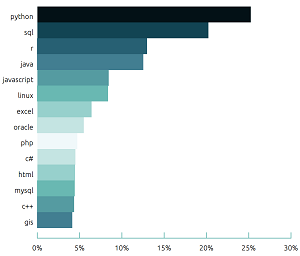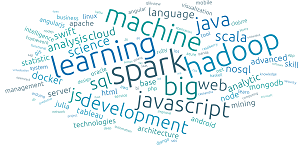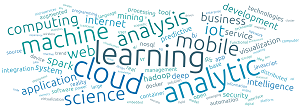News
Report Details Most Lucrative Data Skills
- By David Ramel
- July 16, 2015
Packt Publishing Ltd. has come out with a new survey detailing the money-making skills that pay off the most in the data science and business intelligence (BI) industries. Short answer: R and Python -- and get ready to deal with the Internet of Things (IoT).
"R and Python are still neck and neck as the key data science languages," the "Data Science & BI Salary & Skills Report" states, based on a June survey that garnered more than 20,000 responses. The 24-page report -- downloadable as a free PDF with registration information provided -- seeks to answer the question: "What you need to know to earn more in data science and business intelligence."
Python would be a good start, as it headed the list of top technologies being used daily. "Python is definitely top dog when it comes to data," the report said. "Its versatility and wealth of easy-to-use third-party libraries for everything from machine learning to Web scraping, combined with its low barrier
to entry, make it the ideal choice."
Rounding out the top five technologies are SQL, R, Java and JavaScript. "More than 25 percent of respondents use Python on a daily basis, but almost the same number use R," the report said, inexplicably skipping over SQL.
The report found that Python was being used a lot in conjunction with other technologies, with R, Java and C++ the primary partners.
 [Click on image for larger view.]
Tools Used Daily (source: Packt Publishing)
[Click on image for larger view.]
Tools Used Daily (source: Packt Publishing)
That's for today. For the future, "Distributed computing and machine learning tools are becoming more and more important," the report claimed, while "Augmented reality and the IoT are poised to change how we think about data."
Packt also broke out survey results by technology stacks, finding that different tools were favored by different groups of people performing different roles and tasks in the data science/BI ecosystem. Data visualizers favored JavaScript and programmatic data wranglers (people who squeeze insights out of data) prefer Python, while Big Data experts and data architects choose Java.
 [Click on image for larger view.]
Weighted Tag Cloud Showing Tools To Be Learned in Next Six Months (source: Packt Publishing)
[Click on image for larger view.]
Weighted Tag Cloud Showing Tools To Be Learned in Next Six Months (source: Packt Publishing)
For the immediate future, the tech book publisher asked what tools respondents were planning to learn over the coming six months. It found:
- Spark and Hadoop are well represented, suggesting the growth of cluster computing.
- Web-based technologies are also appearing here, indicating people are seeing a value in sharing data analysis on the Web.
- NoSQL databases are going to keep rising in the data world.
 [Click on image for larger view.]
Weighted Tag Cloud Showing Trends Coming in Next Year (source: Packt Publishing)
[Click on image for larger view.]
Weighted Tag Cloud Showing Trends Coming in Next Year (source: Packt Publishing)
Another question asked what trends will be emerging in next year, finding:
- Machine learning is going to become one of the focal points for everyone working in data, driven by a demand for predictive insights and statistical analysis in a range of sectors and industries.
- Augmented reality and IoT are going to be key challenges for data scientists over the next few years.
- The prominence of mobile ... suggests an increased emphasis on mobile analytics as users move further away from desktop.
- Distributed computing (both on clusters and on the cloud) is going to change the way we even think about data, suggesting increasing anxiety about how to manage resources for Big Data projects. This is possibly symptomatic of the two outcomes above. As IoT and mobile become more dominant, managing larger datasets is going to become a greater challenge.
The burgeoning IoT is prominent throughout the survey results, and Packt, while acknowledging its importance, is unsure exactly how that impact will manifest itself.
"It's possible that IoT will become the buzzword to replace Big Data," the report said. "How data scientists, analysts and architects tackle it day to day isn't clear yet, but it will almost certainly be a challenge that will offer exciting opportunities for data literate people everywhere."
In concluding the report and offering advice to data pros bent on making more money, the final tidbit offered by Packt is: "Pay attention to IoT -- we still don't quite know where it will lead the data world!"
About the Author
David Ramel is an editor and writer at Converge 360.